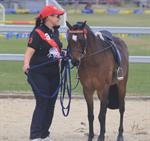EQUINE STUDIES
The most important place to start with learning to care for horses, it to understand how a horse thinks.

Horse Psychology
To handle horses well and to gain maximum enjoyment from them, we need to understand them. To do this, we need to look at the horse's origins and learn how horses lived in the wild. This will give us an insight into the natural behaviour of horses:
The Early Horse
Sixty million years ago the horse was the size of a Labrador dog. It had toes instead of hooves and a smooth tail tufted at the end. Its mane had coarse erect hair. It was a herbivore (grass eater) grazing on vast plains. It was hunted by carnivores (meat eaters). This had a great effect on its behaviour.
Survival Mechanisms of the Early Horse
To escape from its enemies, the horse had to run away swiftly. It developed good hearing and keen eyesight over long distances. It responded quickly to danger signals like sudden movement or noise. It was extremely alert to anything suspicious. Early horses which lacked these characteristics were easily caught and eaten by carnivores. The horses which had good survival skills lived to pass on these characteristics to their offspring. For example, longer legged early horses could run faster and survive better than those with shorter legs. Gradually, over millions of years the horse grew in size
A further survival mechanism of early horses was to live in large groups or herds. This way, there was protection in numbers. There were more pairs of ears to listen for danger. Predators (hunters) could only kill one or two of the herd ‑ the rest would survive.
The Modern Horse ‑ Its Behaviour
The modern horse is a descendant of those early horses who were the swiftest and most alert and with the strongest herd instinct. Even though the horse is not threatened by hunting carnivores today, it still has the same survival traits as its predecessors. The modern horse will react in the same way as the early horse to fear or excitement. It will gallop away, buck (kick up its hind legs), kick and shy (jump sideways).
The modern horse still has a strong herd instinct. We talk of horses being "gregarious" ‑ they like to be with other horses. We can see the horse's herd instinct at work when one horse will refuse to be led away from his companions, or when a badly frightened horse gallops back to his companions. In both cases, the horse wants to be with the "herd" where there is safety and reassurance.
The Horse's Memory
The horse has a very long memory and this is useful in training. The horse will remember that he was rewarded for certain behaviour and will usually choose to behave this way again. He will not often repeat behaviour for which he was punished. Handlers must be consistent in rewarding and punishing horses so that the horse clearly knows what behaviour is expected.
Horses remember frightening things for a long time. If the horse is reminded of a frightening experience he will show signs of fear. An unsympathetic handler will punish the horse for behaving badly. This is unjust. A good handler will reassure the horse so that he loses his fear and behaves well again.
Using Psychology to Handle Horses
In one way, the modern horse is different from the early horse. It has grown taller and stronger. A horse is always stronger than its handler and could choose to run away or attack us with hooves and teeth. We are able to handle horses because they are not aware of their strength and because they like to please. At all costs, we should avoid situations where the horse learns he is stronger than his handler. We must also preserve the horses goodwill by treating him fairly at all times. Firm but kind handling is the key to successful horse management.
All handlers of horses should try to learn as much as possible about Horse Psychology. This will increase their understanding of their horse's behaviour and make them better horsemen/women. There are many good books and videos on horse psychology and handling that may be obtained at book and saddlery stores.
Horses are considered to have memorises second only to elephants, so a well trained horse never forgets its training, nor does a poorly trained horse. Bad habits need to be recognised and corrected early if later problems are to be avoided.
Unlike humans, horses cannot rationalise, but learn from experience. They tend to repeat behaviour that brings a favourable response, and avoid behaviour that causes an unfavourable response from the rider or handler. Horses learn through a system of REPETITION, REWARD and CORRECTION. Horses have no reasoning power; they are unable to connect a reward or correction given several minutes after an action. If a rider or handler is quick to reward a job well done with an encouraging word or pat, the horse will associate that action with an enjoyable sensation and he will be more willing to perform properly next time.
It is most important to correct the horse. Correction must immediately follow the action so that it is clear to the horse what the rider is punishing it for. It is also important to remember that the horse has a relatively short attention span and all educational work should be restricted to set periods suitable to the individual horse’s education and age.
Rewards can be:
Make the desirable things easy and the undesirable things difficult.
Handling Horses
Using our understanding of Horse Psychology, we can handle horses safely and with ease. Remember that the horse is gregarious. It will be easier to bring all the horses from a paddock rather than just one. Avoid making sudden noises or movements around horses. Build up the horse's trust in you by being calm and confident.
Handle horses:
- Calmly
- Confidently
- Patiently and slowly
- Talking quietly
